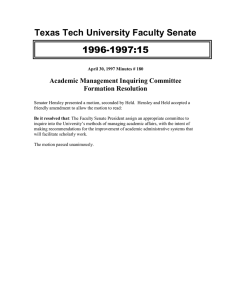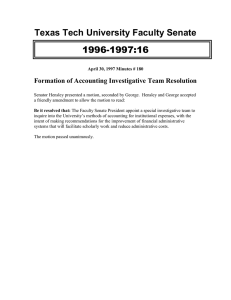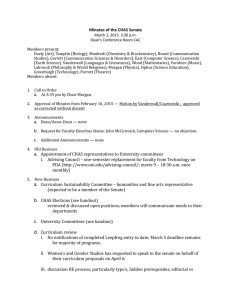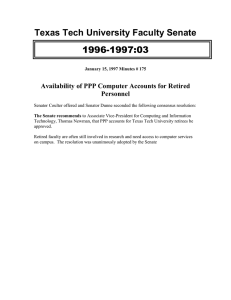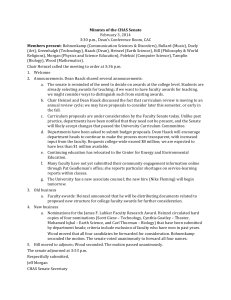Document 11505959
advertisement
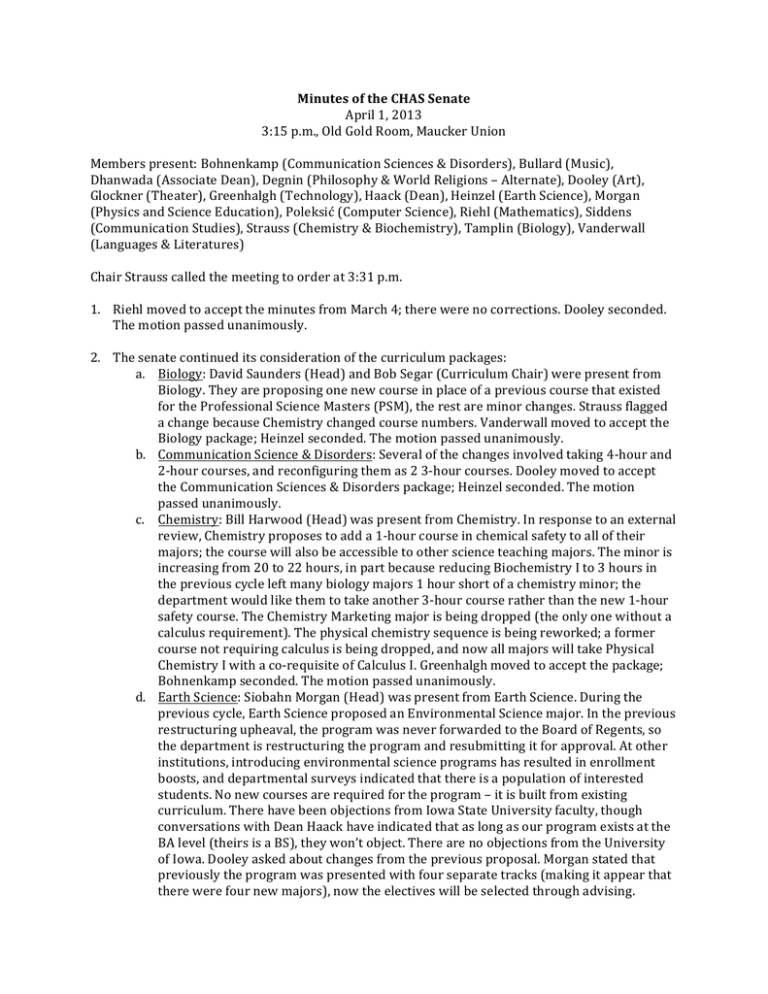
Minutes of the CHAS Senate April 1, 2013 3:15 p.m., Old Gold Room, Maucker Union Members present: Bohnenkamp (Communication Sciences & Disorders), Bullard (Music), Dhanwada (Associate Dean), Degnin (Philosophy & World Religions – Alternate), Dooley (Art), Glockner (Theater), Greenhalgh (Technology), Haack (Dean), Heinzel (Earth Science), Morgan (Physics and Science Education), Poleksić (Computer Science), Riehl (Mathematics), Siddens (Communication Studies), Strauss (Chemistry & Biochemistry), Tamplin (Biology), Vanderwall (Languages & Literatures) Chair Strauss called the meeting to order at 3:31 p.m. 1. Riehl moved to accept the minutes from March 4; there were no corrections. Dooley seconded. The motion passed unanimously. 2. The senate continued its consideration of the curriculum packages: a. Biology: David Saunders (Head) and Bob Segar (Curriculum Chair) were present from Biology. They are proposing one new course in place of a previous course that existed for the Professional Science Masters (PSM), the rest are minor changes. Strauss flagged a change because Chemistry changed course numbers. Vanderwall moved to accept the Biology package; Heinzel seconded. The motion passed unanimously. b. Communication Science & Disorders: Several of the changes involved taking 4-­‐hour and 2-­‐hour courses, and reconfiguring them as 2 3-­‐hour courses. Dooley moved to accept the Communication Sciences & Disorders package; Heinzel seconded. The motion passed unanimously. c. Chemistry: Bill Harwood (Head) was present from Chemistry. In response to an external review, Chemistry proposes to add a 1-­‐hour course in chemical safety to all of their majors; the course will also be accessible to other science teaching majors. The minor is increasing from 20 to 22 hours, in part because reducing Biochemistry I to 3 hours in the previous cycle left many biology majors 1 hour short of a chemistry minor; the department would like them to take another 3-­‐hour course rather than the new 1-­‐hour safety course. The Chemistry Marketing major is being dropped (the only one without a calculus requirement). The physical chemistry sequence is being reworked; a former course not requiring calculus is being dropped, and now all majors will take Physical Chemistry I with a co-­‐requisite of Calculus I. Greenhalgh moved to accept the package; Bohnenkamp seconded. The motion passed unanimously. d. Earth Science: Siobahn Morgan (Head) was present from Earth Science. During the previous cycle, Earth Science proposed an Environmental Science major. In the previous restructuring upheaval, the program was never forwarded to the Board of Regents, so the department is restructuring the program and resubmitting it for approval. At other institutions, introducing environmental science programs has resulted in enrollment boosts, and departmental surveys indicated that there is a population of interested students. No new courses are required for the program – it is built from existing curriculum. There have been objections from Iowa State University faculty, though conversations with Dean Haack have indicated that as long as our program exists at the BA level (theirs is a BS), they won’t object. There are no objections from the University of Iowa. Dooley asked about changes from the previous proposal. Morgan stated that previously the program was presented with four separate tracks (making it appear that there were four new majors), now the electives will be selected through advising. Dooley moved to accept the package; Vanderwall seconded. The motion passed unanimously. e. Music: There is a new class in chamber music, but it is essentially restructuring existing requirements – no new instructors are required. There are changes to the Instrumental Jazz Improvisation sequence. Previously, it was a repeatable credit course; students typically took it 3 times with different topics. Now the courses will be offered as a three-­‐course sequence, but no new resources are required. There is a reinstatement of requirements for vocal programs – previous language about requiring “German, French, or Italian” that had been dropped in previous cycles has been reinstated. Research requirements are being added to masters programs, though electives are being dropped (so no programs are increasing in length.) Riehl moved to accept the package; Heinzel seconded. The motion passed unanimously. 3. The senate continued deliberation regarding the proposed Cornerstone courses. a. Vanderwall asked for clarification on what we are voting for. Strauss stated that we are considering whether or not the courses become part of the permanent catalog, not whether or not the courses are included in the Liberal Arts Core (as was previously suggested), which is the purview of the Liberal Arts Core Committee. b. The senate discussed the possibility of the course remaining experimental. Strauss indicated that the senate should decide one way or another on the course. Riehl commented that a lack of a vote would cause consideration to forward to the University Curriculum Committee without input from the CHAS Senate. Dooley stated that, in his view, this is passing the buck, and it was the job of the senate to make a decision at the college level. c. Riehl noted that there are two issues – whether or not the course can appear in the next catalog, and whether or not the course is an LAC course (though the second question has already been considered by the LAC committee.) Bullard commented that there appeared to be a breakdown in logic – she was being asked to approve something that was already approved elsewhere. d. Vanderwall stated that the primary concern for Languages & Literatures continues to be governance and staffing of the course. He noted that there has been positive movement toward resolution of these issues, and more time could solve lingering difficulties. e. Deirdre Heistad (LAC director) asked the senate whether or not senators had received information about the course since the previous discussion. She stated that the real issue is whether or not the course meets the goals and objectives of the LAC, and indicated the availability of the course syllabi, student assignments, and other artifacts. She stated that the governance structure of the Cornerstone courses has developed organically from within course staff, and faculty involved in Cornerstone felt that should continue, and that governance for the course could not be “heavy handed.” f. Glockner questioned whether or not it was our business to step into what he saw as a territorial dispute. g. Strauss stated that we are not tasked with dealing with the governance issue. She commented that waiting a year to make a decision was not necessarily bad, but questioned whether or not we were able to do so. Degnin questioned whether or not this would take the course out of the two-­‐year review cycle. Dooley stated that he felt such decisions were above our pay grade, and that he felt sufficient information was available for the senate to make a decision. h. Strauss asked if there was a motion. Riehl moved to accept the two-­‐course Cornerstone sequence for inclusion in the next catalog. Degnin seconded. Vanderwall called for a division of the house1, and stated that should the motion pass, it was over the objections of the Department of Languages & Literatures. • Glockner stated that he was not comfortable overriding the objections of colleagues in another department, and not comfortable voting unless we know whether or not the course could be considered during the next curriculum cycle. • Bohnenkamp asked whether or not rejection of the motion would cause the Cornerstone course to continue as experimental. Strauss indicated that this was up to the Cornerstone faculty. • Strauss stated that, should the motion be rejected at this time, the senate might draft a letter stating that we see the course as good, and ask that it continue on an experimental basis. • Poleksić cautioned that we didn’t want to vote on something not proposed – in his view, the course was presented for approval, and we should vote it up or down. • Heistad repeated that the Cornerstone faculty wanted to know what was needed for the course, and mentioned that Chatham-­‐Carpenter had documented consultations regarding continuing issues. She further commented that the course could move forward to the University Curriculum Committee with a divided vote. • While there was discussion from Glockner of a friendly amendment to include drafting a letter, Greenhalgh recommended considering drafting a letter as a second vote. Glockner indicated that he was in agreement. A question was called on the motion: Votes for the motion: Heinzel, Poleksić, Riehl, Siddens, Strauss (5) Votes opposed to the motion: Bohnenkamp, Bullard, Dooley, Glockner, Morgan, Tamplin, Vanderwall (7) Abstentions: Degnin, Greenhalgh (2) The motion failed. Greenhalgh moved that the senate draft a letter to the University Curriculum Committee (and other interested bodies) explaining the senate deliberations and concerns. Glockner seconded. • Glockner reiterated that, in his view, this was a territorial dispute • Haack noted that control of the course is currently in the provost’s office, and he felt it should be governed by the two departments most affected – Communication Studies and Languages & Literatures • Degnin stated that the issue was more than territory; Languages & Literatures needs to have significant input to the course Vanderall called a question on the motion: The motion passed unanimously Strauss indicated that she would assign senators to draft the letter at the next meeting. • i. j. 4. Bohnenkamp moved for adjournment at 4:57 p.m. Vanderwall seconded. The motion was unanimously approved. Respectfully submitted, Jeff Morgan CHAS Senate Secretary 1 Vanderwall indicated that this meant every vote was registered, which was done. Subsequent online research suggests that this literally means senators stand and cluster to indicate their voting preferences – literally dividing the house.
